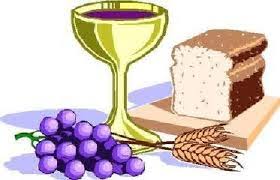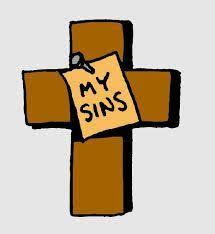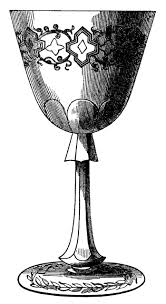Immediately after the Passover, Jesus institutes the Lord's Supper, or what we commonly call communion. You may also hear it referred to as the Eucharist or the Holy Eucharist. These terms all refer to the same thing – the sacrament or ceremony of commemorating the death of Christ by using bread and wine as the appointed emblems of the communion.
 Communion is considered a sacrament by all Christians. (A sacrament is a solemn religious ordinance given by Christ, the head of the church, to be observed by his followers.)
Communion is considered a sacrament by all Christians. (A sacrament is a solemn religious ordinance given by Christ, the head of the church, to be observed by his followers.)
Protestants believe there are two sacraments – communion and baptism.
Catholics believe there are seven – communion, baptism, confirmation, penance, anointing of the sick, matrimony and holy orders.
Although all Christians believe in the sacrament of communion, different groups view it in vastly different ways. As a result, communion has become a source of division in the world wide body of Christ. This lesson is written from the Protestant point of view, however, we will mention some opposing beliefs at the end of this lesson.
But for now, let's turn to scripture. The sacrament of communion is recorded here in Matthew, as well as in Mark 14:22-26 and Luke 22:15-20. It is also referenced by Paul in 1 Corinthians 11:23-25. We will be referencing all of these scriptures in this lesson, so you might want to take a few minutes to read them.
Before we dig in to each aspect of the sacrament, let's examine the overall view of what is happening here. Jesus was creating a remembrance of our redemption/salvation.
Picture this event as a moment frozen in time. Up until this very moment, God's people have lived under the Old Covenant or the Law. They have observed the feast of Passover, a sacrament of the law which was a shadow or picture of the redemption that was to come by the Messiah.
In less than 24 hours, Jesus would end (fulfill) the Old Covenant by sacrificing himself for the sins of the world.
In doing so, he ushers in the New Covenant, the kingdom of heaven, the age of grace. The New Covenant requires a new sacrament – and so Jesus conducts the very first communion service with his disciples, only minutes after observing the final Passover.
Consider how astounding this truly is – scripture has given us a snapshot of the exact moment of the transition between the old and the new sacraments.
Within hours of the time the 'snapshot' of this event took place, another event occurred. It is also recorded in Holy Scripture. It too, is a snapshot forever frozen in time – the most stunning, mind blowing, epic event that has ever taken place in the history of the world – the sacrifice of Jesus Christ!
It is this extraordinary event that we commemorate as we observe the sacrament of communion. Communion should never be approached with a casual air or indifferent attitude. It is not just an empty ritual in remembrance of an event long past.
It is the impartation of life to every believer in Jesus Christ, in every generation. So let's take a closer look at the scriptures. It is my hope that you will be never look at communion the same way after this study.
Matthew 26:26 – Now as they were eating, Jesus took bread, and after blessing it broke it and gave it to the disciples, and said, "Take, eat; this is my body."
First, we see that Jesus 'took bread'. In other words, he picked up some of the bread that was already at hand. Remember, this event is happening at the close of the Passover meal. As we mentioned last time, Passover was immediately followed by the seven day feast of unleavened bread. During that time, the Jews completely removed all traces of leaven from their homes and even businesses. Therefore, there can be no doubt that the bread used in the first communion was unleavened bread. It would have been a thin cake, easily broken and distributed.
The bread itself was ordinary, readily available, unleavened bread. There was nothing particularly special about it. However, because Jesus 'took it' or set it apart for holy purposes, it became holy.
This is how we should view the bread in our present day sacrament of communion. Although it may come from a common, every day source, it has been taken or set apart for a holy purpose. We should always make sure that we respect the communion elements.
In the scriptures, leaven often represents sin. The first communion bread did not contain any leaven; therefore it symbolically contained no sin or was sinless. This makes it a good comparison to Jesus since he truly was sinless. This is not the first time Jesus has used this comparison:
John 6:35 - And Jesus said unto them, I am the bread of life.
Jesus is the bread of life. Just as physical bread is needed for life and nourishment of the flesh, the sacrifice of Christ's body is needed for life and nourishment of the soul.
So we find that Jesus makes a comparison between himself and the bread. The bread is not really his body; Jesus is speaking symbolically. He has done this many times in the past. For instance, he calls himself the 'vine' in John 15:1, and the 'door' in John 10:7. But he was never really a literal, physical vine or door. Jesus was comparing himself to these items, just as he compared himself to the communion bread.
Jesus blesses the bread. The word translated 'blessing' has also been translated as 'give thanks' in other scriptures (see John 6:11). During the blessing of the elements, Jesus acknowledges God as the author of every good and perfect gift. While the Jews were accustomed to give thanks to God for all earthly food, this was different. This thanksgiving was to center on the spiritual aspect of the elements – the atonement of Christ which resulted in the eternal salvation of the human race.
Since the bread represented his body, the breaking of the bread represented the sufferings of Jesus that were about to take place – his body was wounded, pierced, bruised and finally broken by death. Why? What was the purpose?
It was to make atonement for our sins; to purchase our redemption with his priceless, sinless blood:
1 Corinthians 11:24 - And when he [Jesus] had given thanks, he broke it, and said, Take, eat: this is my body, which is broken for you: this do in remembrance of me.
The suffering and sacrifice of Jesus are the exact things that Jesus is instructing us to vividly remember during the communion service:
Luke 22:19 - This is my body, which is given for you. Do this in remembrance of me.
As we come into God's presence during communion and stop to consider what Jesus went through during the crucifixion, our hearts should be stirred. As we look at the bread and juice, we are reminded that he was whipped, mocked, abandoned, pierced with nails, crowned with thorns and hung up to die a painful humiliating death. Worst of all, He experienced spiritual separation from God. As he assumed all of our sin upon himself, He was cut off from the Father.
Not only do we stop to consider the suffering of Christ, we need to stop and consider the cause of that suffering – us. It was your sin and my sin that put Jesus up on that cross. Communion is a time to reflect how much our sin actually cost the Son of God.

So, by participating in communion, we publicly acknowledge our sense of guilt and need of a savior. We also publicly declare our trust in Jesus and our love for him, as well as or desire to be with him always. Consideration of these vital truths will increase our faith, lift our hope, enlarge our love, and strengthen us against sin. The rite of communion is not just an empty ritual. It brings spiritual life to you and me.
Have you noticed that Satan loves to constantly remind us of our sin? He desires to render us ineffective for Christ by getting us to dwell on the shame and guilt of our failures.
But this spell is broken when we enter into communion. Yes, we know we have sinned; but the bread is a clear reminder that our sin has been atoned for. Our part is to 'take and eat' the bread or to appropriate the sacrifice of Jesus with our faith.
Matthew 26:27-28 – And he took a cup, and when he had given thanks he gave it to them, saying, "Drink of it, all of you, for this is my blood of the covenant, which is poured out for many for the forgiveness of sins."
Jesus instituted the use of two elements in the communion rite. The second is the cup. Our physical bodies require both food and drink to be sustained. Likewise, our spiritual man needs both elements, and both are provided exclusively by the sacrifice of Jesus.
The wine or juice represent the blood of Jesus and are referred to as the cup.
What do the scriptures teach us about blood?
For one thing, they tell us that the life of every living thing is in its blood:
Deuteronomy 12:23 - Only be sure that you eat not the blood: for the blood is the life; and you may not eat the life with the flesh.
It also tells us that blood is required for the remission of sin:
Leviticus 17:11 - For the life of the flesh is in the blood: and I have given it to you upon the altar to make an atonement for your souls: for it is the blood that makes an atonement for the soul.
Hebrews 9:22 – Indeed, under the law almost everything is purified with blood, and without the shedding of blood there is no forgiveness of sins.
This was clearly evident under the Law/Old Covenant, which was ratified when Moses literally sprinkled the blood of an animal on the Israelites:
Exodus 24:8 - And Moses took the blood, and sprinkled it on the people, and said, Behold the blood of the covenant, which the LORD has made with you concerning all these words.
Under the Law, only those of Israel could obtain forgiveness through sacrifice. All Gentiles were excluded.
Nearly every sacrifice required blood to be shed and sprinkled on the altar and once a year, the high priest had to sprinkle blood on the Mercy Seat within the Holy of Holies to cover the sins of Israel for another year. This was done year, after year, after year, because the blood of animals could not provide permanent restitution for sin.
The Old Covenant was a shadow of what would take place in the New Covenant, when Jesus would shed his perfect blood for the permanent atonement of sin:
Hebrews 9:12-14 - Neither by the blood of goats and calves, but by his own blood he entered in once into the holy place, having obtained eternal redemption for us. For if the blood of bulls and of goats, and the ashes of a heifer sprinkling the unclean, sanctifies to the purifying of the flesh: How much more shall the blood of Christ, who through the eternal Spirit offered himself without spot to God, purge your conscience from dead works to serve the living God?
Keeping in mind that there is no remission of sin without blood, notice the emphasis placed upon the cup by Jesus. While he simply told them to eat the bread, he expressly states that ALL are to drink of the cup. Thus, all believers in all ages whether Jew or Gentile, are commanded to drink. This is because the cup represents the very essence of our redemption – the blood of Christ poured out for the remission of our sin. The blood/cup is what actually ratifies the New Covenant. Without it we have nothing. 
So, we see that communion is a wonderful and glorious expression of grace – the undeserved favor of God – upon our lives and immortal souls! We bring nothing to the new covenant except our needs – the need for forgiveness, the need for healing, the need for rescue, the need for love, the need for righteousness, etc. For his part, God brings to the New Covenant everything that you and I have need of, PLUS benefits we never imagined in our wildest dreams! And the factor that ratified this covenant between God and Man was the blood of Jesus.
It should be noted that partaking of communion does not save your soul. Each one of us must expressly apply the blood of Jesus to our own spiritual lives/hearts, because that is the way appointed by God for the pardon of our sin. Communion symbolizes the atonement that has already been applied to our lives.
Matthew 26:29 – "I tell you I will not drink again of this fruit of the vine until that day when I drink it new with you in my Father's kingdom."
Two important things are indicated here. One, Jesus is going to die. Therefore, he will not be on earth to lead the communion celebration again. Obviously, that is not a shock to any of us. However, for the apostles, these words of Jesus were an immense consolation. While they were pained by the thought of him dying, Jesus confirms that his death is not a final separation.
This brings up the second point. One day, you and I and all the other followers of Christ will be reunited together in the kingdom of Heaven. At that time, we will partake of new wine as we enjoy everlasting communion with our Savior and we celebrate the blessings and triumphs of redemption. Clearly, communion is not just looking back to what happened thousands of years ago. It also looks forward to a future where we are in Heaven with Jesus, in the presence of God. It is a future where we will enjoy a healthy, fulfilling, productive existence – forever!
1 Corinthians 11:26 - For as often as you eat this bread, and drink this cup, you do show the Lord's death till he comes.
How often are we to take communion? The scriptures are not specific on this point; you can observe the rite of communion as often as you need it. There may be times when once every month or so is enough. But there may be times of chaos in your life where you feel like you need to partake of the Lord's table daily.
The only thing we can say for sure is that communion is a perpetual ordinance; we are to continuously observe this sacrament until we die, or Jesus returns.
Matthew 26:30 – And when they had sung a hymn, they went out to the Mount of Olives.
It was customary for the Jews to sing or chant the 113th, 114th, 115th, 116th, 117th and 118th Psalms during the Passover celebration. The 114th and 118th were typically sung during the observance of the Passover meal, and the rest at the close of the celebration. There is no reason to believe that Jesus sung anything else on the evening he instituted the rite of communion.
This in itself is very instructive. You would do well to take a look at these six short Psalms.
- The 113th Psalm has 9 verses and focuses on praise to God. For instance, this is verse 2:
Psalms 113:2 – Blessed be the name of the Lord from this time forth and forevermore!
- The 115th contains 18 verses and speaks of the glory of God and how he blesses his children.
- The 116th Psalm has 19 verses and speaks of God's righteousness and mercy; it reflects on our deliverance from death and affliction.
- The 117th Psalm has 2 verses; it instructs us to praise our God!
Do you see a pattern here?
Praise and worship are a part of communion. Not only do we remember our sins and reflect on the price that our Savior paid, but in the end there is great rejoicing and cause for celebration.
Who rescues us, and showers us with mercy? Who delivers us from death and affliction? Who exhibits steadfast love and faithfulness to us? Is it not Jesus, our Redeemer, our Savior, our King? How can communion end in anything but great joy, as we realize the new life and freedom we have in Christ? At the close of communion, we should be bursting with praise and worship to our Lord and Savior, Jesus Christ! Hallelujah!
Additional Viewpoints:
Previously, we noted that Protestants and Catholics both believe in the sacrament of communion, but practice it in vastly different ways. One of the major differences is how the two groups view the actual elements.
Protestants view the bread and juice as exactly that – bread and juice. They are symbols that represent the body and blood of Christ, nothing more.
Catholics, however, believe in transubstantiation, which is defined as 'a change into another substance'. Roman Catholics believe that the bread becomes the actual flesh of Jesus and the juice becomes the actual blood of Jesus as the elements are consecrated by the priest, however, the elements still appear as bread and wine.
The Lutherans and Anglicans have yet another point of view. They believe in consubstantiation. In this doctrine, the bread is both bread and the body of Christ at the same time. The juice is both juice and the blood of Christ at the same time.
An in depth study of other viewpoints is outside of the scope of this lesson. However, there are many other resources that you can access if you wish to do a self study on the different practices of communion.
Let me offer you some encouragement:
Communion connects us to the past. As we take a quiet moment of reflection to recall Christ's sacrifice for us, we should be encouraged. Even though thousands of years have passed, His blood never loses its power or runs dry. We may stumble and fall in our Christian walk; we may sometimes make poor choices or give into sin. But forgiveness is still available through the precious blood of Christ.
Let me offer you some relief:
Communion is relevant for the present day. It reminds us to rejoice in the New Covenant that Jesus has brokered between God and mankind. Because of that covenant, you and I can walk in victory every day. So if the chaos of the world is getting you down, look for relief at the communion table. Spend time praising and worshipping our Redeemer. Dwell on the mighty promises of the Word. Soon you will find relief from the uncertainties of daily life.
Let me offer you some strength:
Communion connects us with the future. It strengthens us with the promises of tomorrow. It reminds us that one day, Jesus will return for his church. We will spend eternity with Him in the kingdom of heaven, where he will once again drink of the fruit of the vine with us. Hallelujah!

